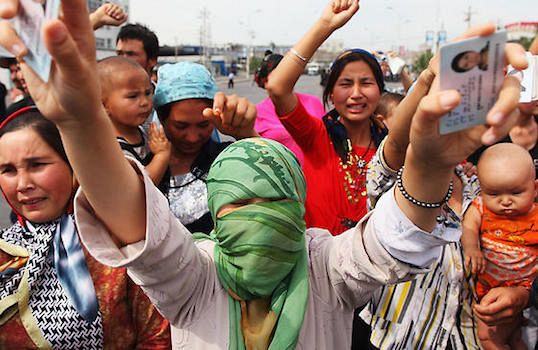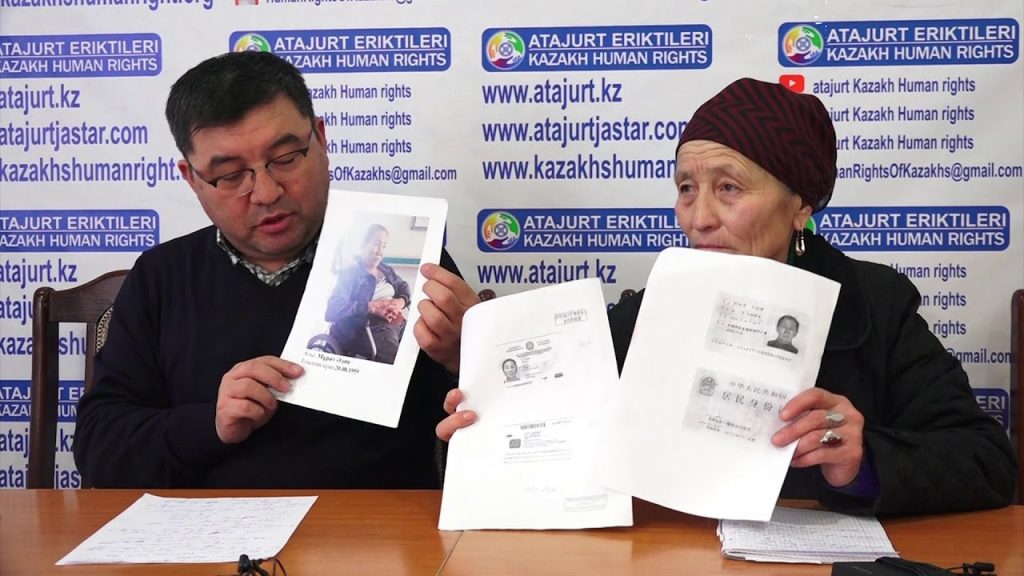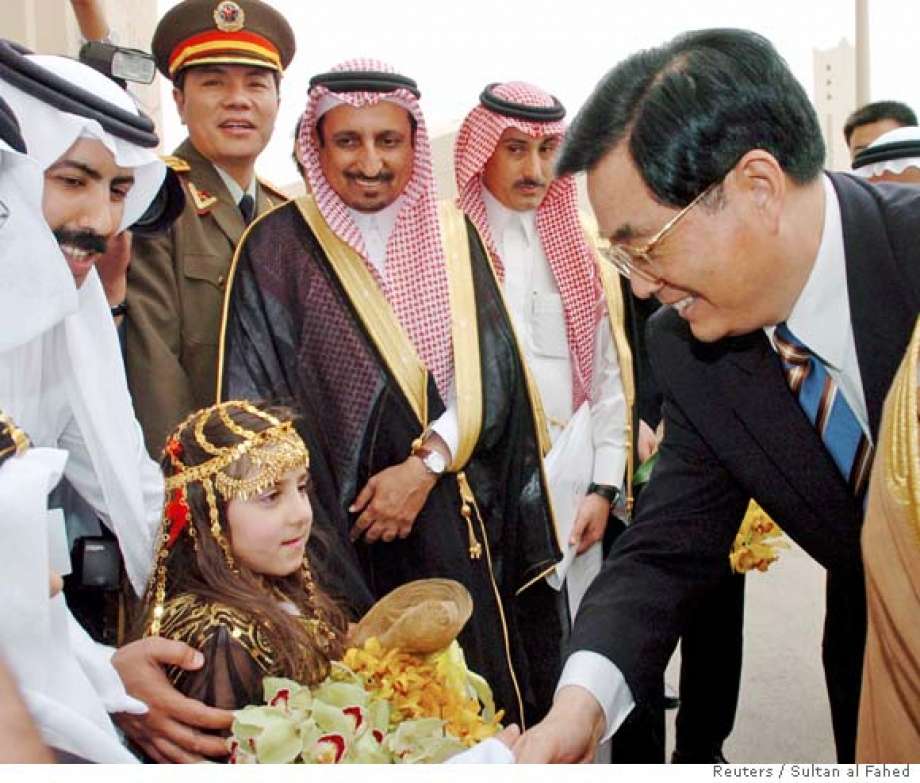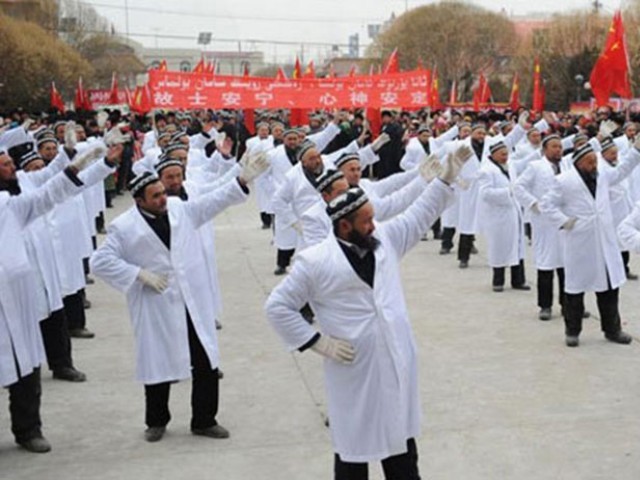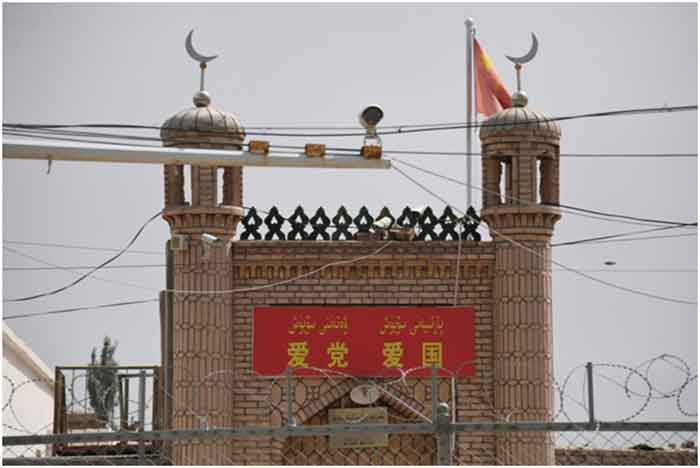
With 16,000 mosques damaged in recent years, the autonomous region of Xinjiang now has the lowest number of Muslim houses of worship since the 1960s Cultural Revolution (AFP)
To persecute the Uyghur Muslims, the demolition of mosques across China in recent times has drawn an international outcry. It started with the detention of the Muslims in internment camps in Xinjiang province. More than 1.5 million Xinjiang Uyghurs, Kazaks and members of other Central Asian ethnic minority groups have been held in camps. This is part of a huge propaganda campaign of the Communist Party to turn all ethnic groups’ loyal followers of the party. Since 2017 China has accelerated its detention program. Afterwards China started damaging and altering the mosques, holy shrines and the places of yearly pilgrimage. The government has closed some of the state protected routes to reach the holy sites. With the demolition of Muslims’ place of worship, China is trying to remake its Muslim culture. The systematic removal of these structures would make it harder for the young Uyghurs growing up in China to remember or to relate to their distinctive Muslim heritage. By destroying the mosques China is wiping out the cultural and religious tradition of the Muslims. New research shows “Chinese authorities have razed or damaged two-thirds of the mosques in China’s remote northwestern region of Xinjiang, further illuminating the scope of a forced cultural-assimilation campaign targeting millions of Uighur Muslims.”
The government is of course doing it in the name of containing terrorism. To root out terrorism the communist government is hell bent on in creating a society that will only be loyal to Beijing. It also says to bring much needed development in the region its priority is to eliminate any kind of threat. Some parts of Xinxiang got a billion dollar makeover to remake the existence of an entire ethnic group. As a result a lot of the ethnic Muslim leaders are disappearing from the area. Uyghur language books are vanishing from the bookshelves, reported a team of the Wall Street Journal reporters during their recent visit in the area. A video supporting their claim shows Uyghur’s new makeover by comparing footages from only a year before.
“Nothing could say more clearly to the Uyghurs that the Chinese state wants to uproot their culture and break their connection to the land than the desecration of their ancestors’ graves, the sacred shrines that are the landmarks of Uyghur history,” Professor Rian Thum of the University of Nottingham told the Guardian.
A recent published report by the Australian Strategic Policy Institute said, “Satellite images showed that roughly 8,500 mosques, close to a third of the region’s total have been demolished since 2017.” Another 7,500 sustained damage.
“Out of 91 sites analyzed, 31 mosques and two major shrines, including the Imam Asim complex and another site, suffered significant structural damage between 2016 and 2018”, reported the Guardian. “Of those, 15 mosques and both shrines appear to have been completely or almost completely razed. The rest of the damaged mosques had gatehouses, domes, and minarets removed. A further nine locations identified by former Xinjiang residents as mosques, but where buildings did not have obvious indicators of being a mosque such as minarets or domes, also appeared to have been destroyed.”
Experts say the destroying of religious sites marks a return to extreme practices not seen since the Cultural Revolution when mosques and shrines were burned, or in the 1950s when major shrines were turned into museums as a way to desacralize them.
How it all got started
Since the establishment of People’s Republic of China in1949, Communist China has discouraged religious practices. They had inherited the anti-religious stance taken by Communists in showing contempt for all religious beliefs. Religion is considered an enemy of socialism in China and falls within the regulated framework of state approved “standards.” Religious practices were thus particularly difficult to observe during Mao’s Cultural Revolution (from 1966-1977) when many practitioners of religion were persecuted by the communist party “Red Guards.” In the recent years, active suppression is not as grim as it used to be, and the influence of religion now has been considerably abated from the standpoint of the Beijing government. China once eased up a little on giving people religious freedom, but with one party rule, it still has serious aversion to any kind of religious activities.
From the beginning of Marxism, there has been no love lost between this communist ideology and religion. Marx declared religion as the “opiate of the masses.” The oppressed, the poor, the proletariat in general would resort to or find solace in religion simply because it provided an escape from the harsh economic realities of everyday life. Although Marx was not totally unsympathetic towards religion, 20th century communists interpreted it in harsh “materialist” terms. Lenin, Stalin, Trotsky in Russia, and Mao Zedong in China followed the notion first proposed by Marx of seeing religion as a tool used by the capitalist classes to deceive the masses oppressed under a pitiless economic system. When the Communists won the civil war in 1949, the symbols of “Old China” were pushed aside in favour of the Maoist ideology. Part of this old China consisted of religions such as Buddhism, Daoism, Confucianism practiced by the majority of the ethnic Han Chinese, as well as Christianity and Islam, the latter largely practiced by a few million Uyghurs in Xinxiang in Western China. The state looked at the economic conditions of the majority, and decided that an ideological struggle, based on Maoist ideas best provided the means for uplifting the condition of the masses. Set aside temporarily, at least for the first few decades, was the tension between the ethnic Han Chinese, and Muslim Uyghurs in Xinxiang. The focus was, in Marxist parlance, on class struggle instead.
With major economic changes and social services upgrades, China now is akin to 1890s America – a cross between capitalism and socialism. In spite of repeat assurances by Beijing that ethnic Uyghurs living in China’s mostly Muslim Xinjiang region enjoy full religious freedom, government workers routinely block their right to fast during Islam’s holy month of Ramadan, sources in the region say.
Since the 1990s, “the Chinese government grew increasingly nervous about the expansion of mosques and revival of shrines in Xinjiang. Officials saw the gathering of pilgrims as kindling for uncontrolled religious devotion and extremism, and a spate of antigovernment attacks by discontented Uighurs set the authorities on edge.” – The NY Times
In 2016, right before Ramadan started, I recall reading two back to back reports about religious ban in China. The top Chinese officials led by president Xi Jinping have warned people, especially those Muslims living in Xinjiang province, to excuse themselves from any kind of religious practices. Four days before the start of Ramadan, China put a ban on the Muslims to refrain from fasting during the holy month of Ramadan. The strict warning essentially had reiterated that all Chinese must adhere to China’s state policy of “Marxist Atheism.” The government had ordered no special provisions to be made during Ramadan. It had instructed all businesses to remain open without any exception. Anyone who had failed to comply was dealt with in accordance with the communist code of conduct.
On June 02, 2016 China also issued a white paper glorifying “unprecedented” levels of religious freedom in Xinjiang, adding that “no citizen suffers discrimination or unfair treatment for believing in, or not believing in, any religion,” according to official media. However, several local government departments and middle or high schools in the Uyghur region had simultaneously posted warnings online ordering restrictions on the Muslim duty to fast during Ramadan; local sources told RFA’s Uyghur Service. “We have forbidden [ruling Chinese Communist] Party members, cadres, civil servants, and village officials, in fact anyone drawing a salary from the state, from praying or fasting during Ramadan.” Xi Jinping’s remarks were made at the Second National Work Conference on Religion. It has been reported that all Chinese state media broadcast his message nonstop.
As a practicing Muslim, I cannot imagine anyone telling me that I cannot pray to Allah or fast during Ramadan. For Muslims, Ramadan emanates from the spiritual rejuvenation inspired by the selfless act of fasting. We also fast because it is obligatory for every mature, sane and healthy Muslim as it is a means of helping ourselves to fulfill the directives of Islam. Here in the Washington DC area Ramadan always falls in the summer where the sun sets at 8:40 pm and we endure this practice of fasting without complaining about the long hours.
Since 2016, I have been reading how millions of Syrians at refugee-camps throughout Europe are breaking fast with simple meals that are made from their monthly food voucher or donated food packages. Such stories only increase one’s conviction. I read a story about one refugee family who had escaped to Sweden. This particular city is close to the North Pole of the earth and in the summer, the sun can often be seen past midnight. Therefore, those refugee Muslims had to fast for many more extra hours than we did. While talking to a reporter, the father in the family didn’t complain about that or the bad food. Jokingly he had added that he has nothing against his wife’s cooking, but during Ramadan, he misses his mother’s Kawaj (Syrian version of kufta) that she used to make for iftar when he was a boy. The Chinese government wouldn’t be moved by such stories and take into account why Muslims need to live their lives according to the tenets of Islam.
After decades of relative openness that allowed more moderate forms of Islam to flourish, China’s latest endeavor of destroying mosques is a warning aimed at the Uyghurs, who in recent times have become very aggressive in their protests against the state. Xinjiang borders Pakistan where the hardline Islamic teachings flow more easily; the Chinese government fears that the entire province will be radicalized if it doesn’t stop the influence of Islamic messages. Xi Jinping’s message is often directed to the government of Pakistan. Another very important message by President Xi made it very clear about China’s State policy of intolerance towards Pan-Islamic tendency to the people. He asked all Chinese citizens “not to confuse themselves with non-CCP (Chinese Communist Party, my note) approved tendencies” and to “never find their values and beliefs in this religion or that religion.” He has been asking the Uyghurs to resist overseas intrusions through religious means and to safeguard against ideological infringement by Islamic extremists across the border.
The Chinese leaders are convinced and terrified that Islam in some parts of China is making the nation vulnerable to extremist infiltration, and cautioned its people to stay vigilant against everything Islamic, including halal products. They, in no uncertain terms, made it clear that halal products will not make into the Chinese markets.
Muslim students in schools are forbidden to believe in religion and are barred from religious observance, such as praying and fasting according to a letter posted online by administrators of High School 46 in the regional capital, Urumqi from 2016 onwards. The letter is addressed to the parents of students at the school. Another letter was also sent to the parents where it said anyone under 18-year should not enter the mosque to pray. “Parents should follow the Party’s rules of education and bar their children from illegal religious activities such as praying, fasting, going to mosques, wearing religious dress, studying religion, and so on,” the letter read.
A student studying in western Xinjiang’s Kashgar University had claimed that students are forced to eat during Ramadan. At his school, the administrators now “regularly check each classroom and force Uyghur students to drink water or eat something in front of them.” Students’ bags are routinely checked during the day to see if they contain food meant to be eaten when the day’s fast ends at sundown. If any is found, the students are made to eat them right away. “The university administration always warns us that if students fast or pray, they will be expelled from the university or will not receive a diploma or certificate when they graduate,” said the student.
The local families who are under suspicion that they may be fasting are invited to the village office to “drink tea” to see if they are really fasting or not by the “stability worker.” They also use other means to get information on villagers’ religious activities through their “secret eyes and ears” or through their “neighborhood-watch” program.
The owner of a traditional medicine store in Hotan named Obulqasim said, “I have heard from friends working in government departments that water bottles are being distributed to civil servants and other cadres, and that they must drink these in front of others.” With an estimated 4 million Muslims living in China, these kinds of absurdities happen every year during Ramadan.
To promote the position of the communist government, many newspapers regularly run articles on why religion should not be allowed to be practiced in the country, and expressed support for the newly refreshed policies that were already in place.
Since China has declared the year 2016 as the “Year of Ethnic Unity and Progress,” it is beyond me why it is urging the Muslims not to follow through the religious practices mandated by Islam. Does Xi Jinping with his stalwarts believe that religious practices by the Muslims could emerge as a competing force if it is not nipped in the bud? Or is China simply fearful of religious wall being drawn? What good is “religious freedom” if the Muslims do not have exclusive rights to defend their faith against those who do not respect their wish to worship and carry out religious practices? If the Communist Party wants religious belief should be maintained within the compounds of religious sites such as a mosque, temple or a church, then why the mockery with pronouncements that just proves the opposite? In the name of controlling terrorism why are thousands of mosques being demolished? If China believed in “religious freedom” they would not call domes and minarets “un-Chinese.” They would not destroy or damage thousands of religious sites in recent years. They would not erode the cultural and religious heritage of the Uyghurs, Kazaks and members of other Asian ethnic groups and force them to be loyal supporters of the Communist Party.
The state is now interfering with anyone observing fasts during Ramadan, praying five times a day, growing a beard, burning incense, wearing a hijab and following dietary restrictions in regards to halal food and so forth.
China’s anxiety of radical Islamic ideas spreading across the border perhaps is a genuine one as no country wants the Islamic militants inside their territory. China is concerned about its national security, and said it will target all those who assist in the “propagation of Islam.”
Reports from Xinjiang indicate that “China has converted mosques into communist propaganda centers, entertainment halls or bars that serve alcohol, which Muslims consider haram (forbidden). People living in Xinjiang can’t talk about the elimination of mosques directly out of fear of the authorities,” said Rushan Abbas, head of the advocacy group Campaign for Uyghurs. People there “don’t say, ‘Look, this mosque became a bar,’ but they will say, ‘Oh, we have a new bar here, which was the old mosque. How wonderful,’” Abbas said. “But we get the message.”
China staunchly defends its policies in Xinjiang. President Xi has said that he will reinforce his new policies with renewed vigor as China is looking at Pakistan sponsored Islamic radicalisation of the Uyghurs. Such policies may lead to the extinction of the minority cultures. On the flip side, it could be interpreted as China is the only world power where the Maoist/Marxist-Leninist ideology continues to thrive. Perhaps the whole sham about “freedom of religion” is to hide the fact that it still embraces Marxism-Leninism and its Chinese variety, Maoism and the government wants to have a very tight grip on religion, especially Islam.
Zeenat Khan is a freelance writer. She lives in Maryland, USA
SIGN UP FOR COUNTERCURRENTS DAILY NEWSLETTER

